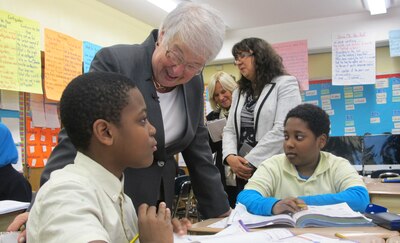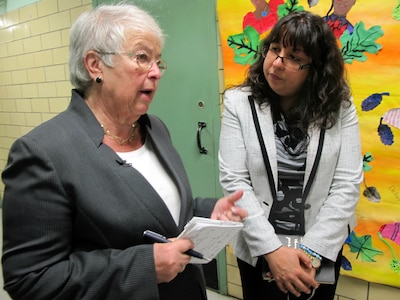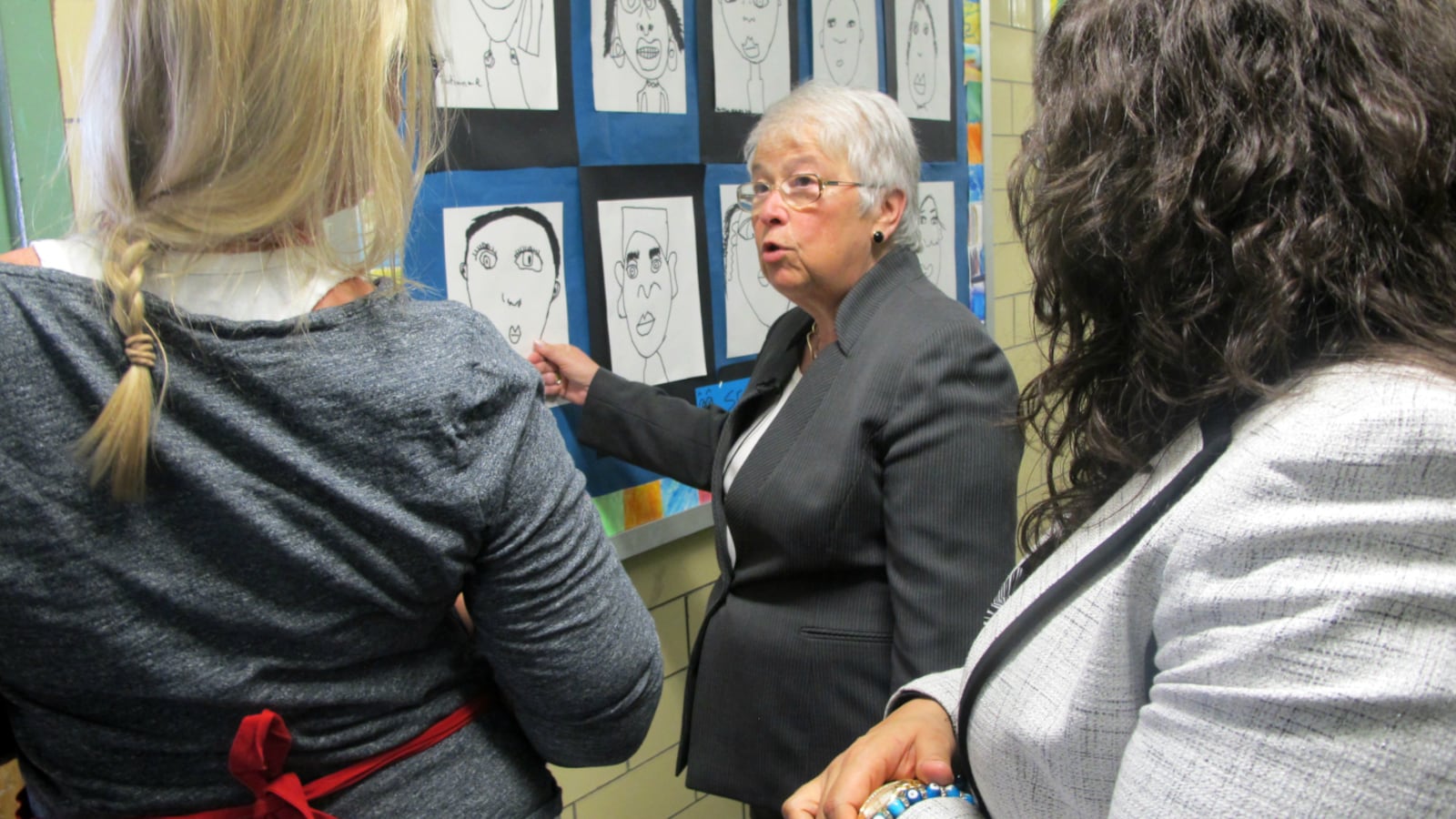When P.S. 123 in Central Harlem has popped up in the news over the past year, the coverage has not been flattering.
There was the story this month highlighting the school’s “nightmarish” test scores and “unsafe” conditions, one last summer citing its many suspensions for students’ “physically aggressive behavior,” and another in October where a principal unfavorably compared P.S. 123’s academic record to that of his charter school.
So when Chancellor Carmen Fariña invited reporters Tuesday to join her and P.S. 123’s principal on a tour of the school, which is part of the city’s new turnaround program for struggling schools, she mixed advice for the principal with praise for bright spots at the school that haven’t grabbed headlines.
As with other schools in the turnaround program, Fariña said P.S. 123 must get students to show up to class every day, weave writing instruction into every subject, and better train teachers while urging the least effective ones to leave. But, noting the school’s many students who are homeless or have special needs, Farina said Principal Melitina Hernandez has already done great work reaching out to their families and using the arts to draw students into school.
“Let me tell you something: There’s a lot here to build on,” Fariña told Hernandez, who took over the school in 2013, as they walked shoulder-to-shoulder down a hallway. “There’s nothing here that you don’t see progress and you don’t see things moving forward.”

P.S. 123 is in the city’s turnaround program, called School Renewal, because it ranks among the bottom bottom 5 percent of schools in the state and the lowest quarter of schools in the city. Last year, 5 percent of its students passed the state math exams, and 9 percent passed English.
It was those scores that Khari Shabazz, principal of Success Academy Harlem 5 charter school, compared to his school’s last October. The charter school, which shares a building with P.S. 123, had 97 percent of its third and fourth-graders pass last year’s state math exams, and 68 percent pass English. (Citywide, 34 percent of students earned proficient scores in math, and about 28 percent in English.)
Fariña on Tuesday called such a comparison “definitely apples and oranges.” She noted that nearly a third of P.S. 123 students have disabilities, about one-fifth are still learning English, and more than a quarter live in temporary housing. She said the lottery admissions system at charter schools attracts the most involved parents, and she again suggested that some charter schools shed students in a way district schools do not.
“We would like to be at that percentage,” Fariña said, referring to the Success school’s exam pass rates, “but we keep all our kids from the day they walk in the building.”
Still, Fariña made clear that she expects P.S. 123’s test scores to rise regardless of the many challenges its students face. And Mayor Bill de Blasio, who has been touting the Renewal program in recent weeks, has insisted that he will consider closing schools that fail to improve even with the added support.
Hernandez said she has already received some help through the Renewal program, which launched in November. Turnaround officials have visited the school and offered feedback, she has been given budgeting assistance (though no extra funding yet), and 10 teachers have attended training sessions for a particular writing program, she said.
But, unlike a small group of high-priority struggling schools that the city has given intensive help since the start of the school year, P.S. 123 has only recently received support through the program, Hernandez said. For example, the city has not sent the school a principal mentor or on-site teacher coaches or monitored its progress throughout the fall as it did with some of those early-intervention schools.
“We’re actually a Renewal school starting tier two, is it? Stage two. We’re just beginning the process,” Hernandez said, adding later that she had sent her teachers to training sessions and brought in coaches well before the Renewal program got underway. “We already started a lot of this work through our own urgency.”

That work was aided by earlier improvement programs for low-performing schools, including a three-year, $4.1 million federal grant that P.S. 123 won in 2013 to fund teacher training along with arts and sports activities.
During Tuesday’s tour, Hernandez said the school had used that money to install electronic whiteboards in classrooms, fill a technology room with top-of-the-line computers, and add after-school and Saturday classes. The school has also established a competitive chess team, healthy cooking classes for families, and a partnership with a nonprofit that sends teaching artists into schools, Hernandez said.
Fariña commended those efforts, but also made plain her own priorities for the Renewal schools.
Throughout her visit, she said P.S. 123 needs to stay focused on improving its writing instruction and tying it into every class. (She told two different art instructors to add more writing to their projects, and asked a kindergarten student to show her some of her writing.) She also said Hernandez must boost the school’s attendance rate, perhaps by having older students check in on younger ones through a “phone buddy” system or buying alarm clocks for others.
And she said the principal must weed out unmotivated or unsatisfactory teachers by documenting their performance problems and advising them to look for jobs elsewhere. After they stopped by the classroom of a teacher whom Hernandez said she had concerns about, Fariña told her to observe the teacher “many, many more times a day.”
After the tour, Fariña explained that principals can use such methods to convince teachers who are not a good fit for a school to leave.
“Not everything has to be knocking people on the head,” she said. “But if that’s what it takes, we’re happy to do that as well.”

